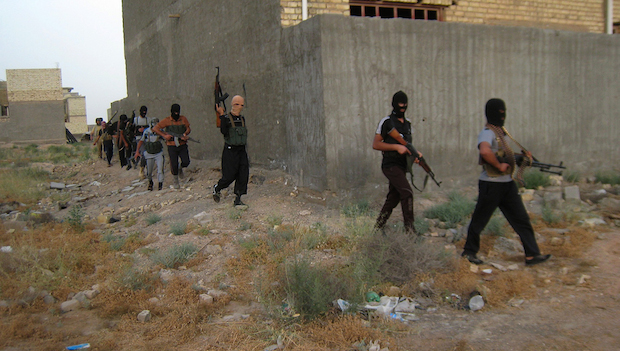
In this Monday, April 28, 2014 file photo, masked anti-government gunmen move with their weapons as they patrol in Fallujah, Iraq. (AP Photo, File)
Baghdad, Asharq Al-Awsat—Iraqi Prime Minister Nuri Al-Maliki has called on the security forces to stand firm in battles with militants in Anbar, amid criticism of the government’s handling of the crisis in Iraq’s largest province.
In his weekly address on Wednesday, Maliki said soldiers and police should ignore “disorderly voices” in the fighting to reclaim the city of Fallujah, which the government has been attempting to recapture from insurgents for five months. Those “voices” appeared to include members of the Al-Qaeda-inspired Islamic State of Iraq and Syria (ISIS).
Maliki said: “There should not be any consideration given to the terrorists under any pretext,” and called for the “punishment of those who covered up, cooperated with or remained silent about this phenomenon . . . Laws must be complemented with maximum levels of resolve and force in the face of Al-Qaeda.”
Maliki’s opponents in the Iraqi parliament have kept up their criticism of his government’s handling of the crisis, accusing him and his Cabinet of trying to deceive the public about the progress made by government forces and allied tribal militias, as well as the nature of the fighting.
Talal Al-Zawba’i, an MP for the Arabiya List for the Abu Ghraib area near Fallujah, told Asharq Al-Awsat: “What is strange is that we have been hearing for months about the continuous fighting and clashes and the victories achieved, according to government and military forces, but what has been taking place in reality is completely different.”
“There was a lack of information, as well as confusion, over who was with ISIS and who was against them, and over what we heard about tribal moves to reach a peaceful solution through negotiations in Amman and Erbil,” he added.
The MP also called on the government to tackle the root causes of the unrest in the province. He said: “Whatever the circumstances, only the government is able to find a radical solution to the crisis in Ramadi, through providing radical solutions to the problems and crises which forced the people to demonstrate for a year,” referring to predominately Sunni protests in the province against Shi’ite Maliki’s government.
Zawba’i also criticized “the security commanders’ choice of a military solution by directing strikes and bombardments, which were mostly arbitrary and caused civilian casualties . . . Even if military action was needed, then it should have been linked to a political objective.”
Elsewhere in the restive province, a spokesman for the Iraqi military based at its headquarters in Anbar said that troops fought a series of battles on Wednesday against ISIS-linked insurgents north of Ramadi, the provincial capital 70 miles (110 kilometers) west of Baghdad.
The army claims to have secured Ramadi in mid-March after two months of fighting.
According to a statement released by the spokesman, “Clashes erupted between army and police forces on the one side and tribal forces and ISIS armed fighters on the other, the latter of whom were driving 4×4 vehicles in a number of areas north of Ramadi.” The number of casualties was not known at the time that statement was released.
It added that “the armed fighters attacked checkpoints and security forces’ positions with medium and heavy weapons.”
A leading cleric in Anbar, Sheikh Ghassan Al-Aithawi, told Asharq Al-Awsat on Wednesday that despite the army’s claims, ISIS fighters were still present in Ramadi.
He said: “There are many areas in Ramadi which have not been cleared of ISIS’s men. They are in the areas of Bouabaid, Boudhiab and parts of the Malahmah area, because the military operations there do not include taking control of the territory, which allows ISIS men to return.”
“The battles on the outskirts of Fallujah aim at weakening ISIS and simply besiege them for as long as possible,” he said, adding that he “did not expect the city to be stormed due to the internal and external political problems that would result, which could turn the game against the government.”
In Fallujah, the city’s general hospital announced that 16 civilians were killed and injured by army bombardment of the center and north of the city on Wednesday.
The hospital issued a press statement on Wednesday saying: “Troops based on the outskirts of Fallujah bombarded the areas of Joulan, Nazzal, Jubail, Mu’alimin, Andalus and Dubbat with rocket launchers and artillery, killing seven civilians and injuring nine seriously. They also destroyed 13 houses and six shops.”
On Tuesday, ISIS militants claimed responsibility for recent bombings in Baghdad, and vowed to launch more in response to the security forces’ operations in Anbar.
A statement by the group published on one its websites said: “We in Baghdad [province] announce the launch of a military operation starting on Tuesday against the headquarters and buildings of the apostate government and its parties and militias, in revenge for the aggression they launched against our people in Fallujah amid extraordinary international silence.”
